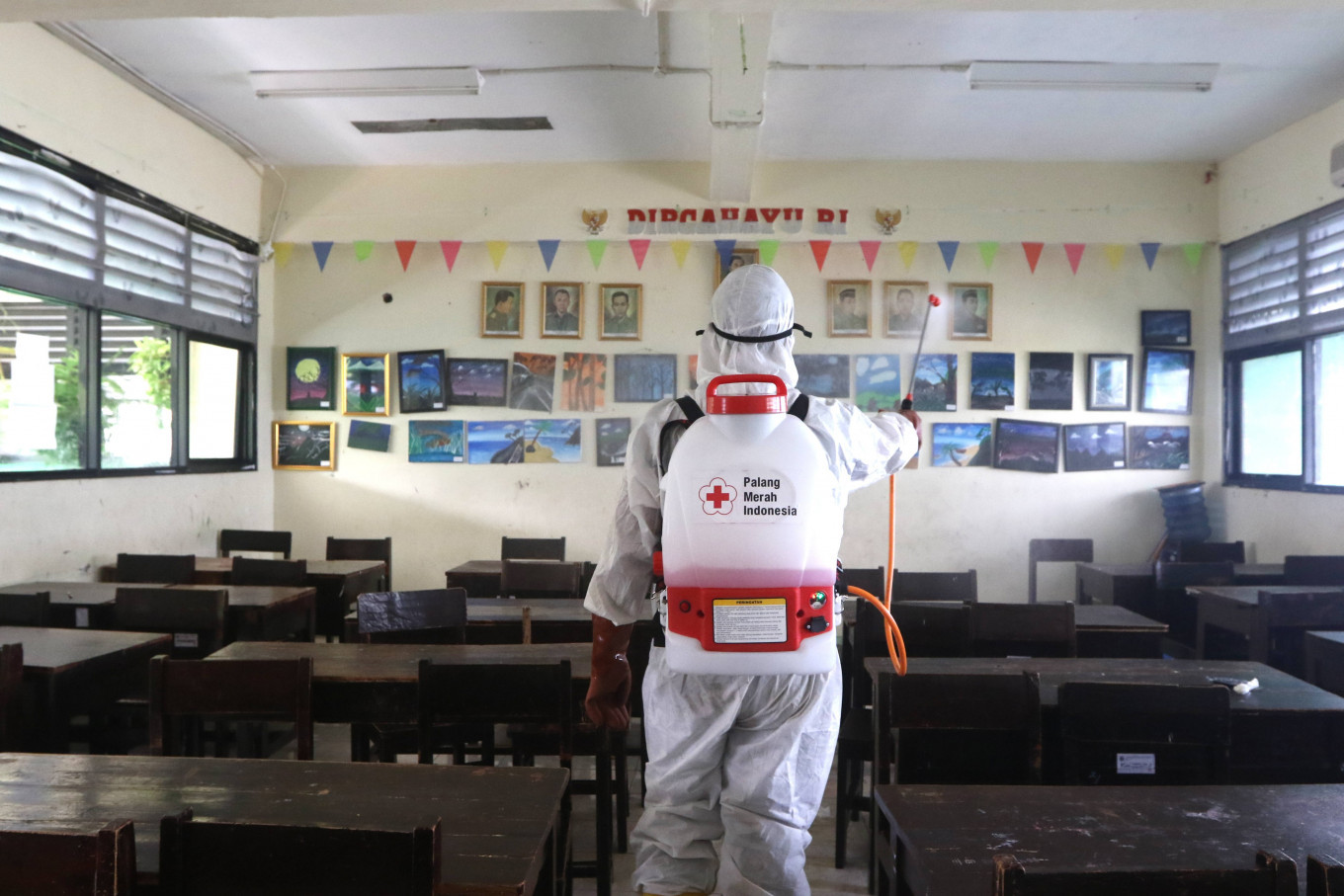Popular Reads
Top Results
Can't find what you're looking for?
View all search resultsPopular Reads
Top Results
Can't find what you're looking for?
View all search resultsPandemic exposes private school vulnerability
80 percent of private schools target lower socioeconomic groups
Change text size
Gift Premium Articles
to Anyone
T
he COVID-19 pandemic has taken a toll on educational institutions across the country, with children from low-income families who attend private schools bearing the brunt of the impacts.
With millions of Indonesians pushed out of jobs and scraping by with reduced incomes because of the prolonged epidemic, parents have struggled to pay for their children's tuition, said Indonesian Private Education Forum Body (BMPS) head Saur Panjaitan.
Private schools are often associated with students from elite families, but in Indonesia, they account for a portion as 80 percent of private schools in the country target lower socioeconomic groups, Suar said. They offer alternative education for students who cannot pass the tight competition for seats in state schools.
"The foundations that run these schools have had their cash flow disrupted [...] They're running out of money," he added.
As a result, these foundations had to find ways to keep operating and pay for teachers' salaries, all the while dealing with the additional costs and hurdles of online learning that have rendered them largely unprepared. Some have had no choice but to allow parents to pay their children’s tuition fees in installments, Suar said.
With many parents working in the informal sector — automatically preventing them from guiding their children when studying at home during the pandemic — and the lack of virtual learning facilities at home and offered by schools, Saur said online learning had not been entirely effective.
Read also: Government pushes for school reopening
This has only widened the persisting gap between private schools targeting students from different socioeconomic groups but also between private and state schools — with the latter having received more assistance.
In Jakarta, for instance, students in the prestigious private school chain Labschool were able to adapt to virtual learning; some were even able to spare an extra laptop or gadget for monitoring during exams, said Labschool’s deputy for academic affairs, Achmad Ridwan.
Leeway was given to a small number of parents affected by COVID-19, but in general, operations have been running smoothly, with the schools even seeing a spike in new applicants, he said.
Education and Culture Minister Nadiem Makarim has acknowledged the many problems that have put the sustainability of private schools at risk. For the first time ever, the ministry allocated last year two schemes of the government's school operational aid (BOS) usually given exclusively to public schools, to private schools. This is to ensure that "no more private schools will close down" during the pandemic.
The first scheme targets private schools in the outermost and disadvantaged regions and those hardest hit by COVID-19; the other private schools that perform well in these regions.
Last year, the government earmarked Rp 3.2 trillion (US$220 million) for the two programs, targeting over 56,000 state and private schools most in need of assistance. Along with the regular scheme, which can be used for maintenance and procuring health and safety facilities, the government allocated Rp 54.32 trillion to new student admissions at both state and private schools, covering 45 million people.
The ministry announced last month that this year, Rp 52.5 trillion would be allocated in BOS funds to over 216,600 schools of all education levels. However, the amount will differ between regions, adjusting to local construction costs and the number of students.
Given the demands and future projections, state schools will not be able to accommodate all students, so private schools remained pivotal, Nadiem said last year. Providing enough schools proves necessary as the government is working on improving the country’s gross enrollment rate, which saw a big drop between levels of education partly due to the tight competition for admission.
The admission rates were 106 percent in elementary school, 92 percent in junior high and 84 percent in high school last year, according to Statistics Indonesia (BPS) data. The rate can exceed 100 percent as it may include students from different age brackets. The higher the level of education, the fewer state schools available, increasing the role of private schools.
Read also: Remote learning takes mental health toll on children, parents
But Saur said he had yet to see the government’s long-term plans in terms of private schools' involvement in Indonesia's education system. He argued that the persistent dichotomy between private and state schools had been harmful, with local administrations still showing bias toward assisting state schools while also increasing the latter's quota, depriving private schools of students and support.
"Even without the pandemic, I personally think there will be no more private schools [that target lower-income students] Will private schools still be needed in the future? If that's the case, don't let us hang in balance," he said.
Now that the government has pushed for school reopening in July, private schools appear upbeat.
Ridwan said Labschool branches have been preparing for reopening, having procured dozens of contactless handwashing facilities, thermo guns and masks and even considering routine COVID-19 testing for students.
Meanwhile, Saur said the government would need to help low-income private schools procure the facilities needed to apply health protocols.










